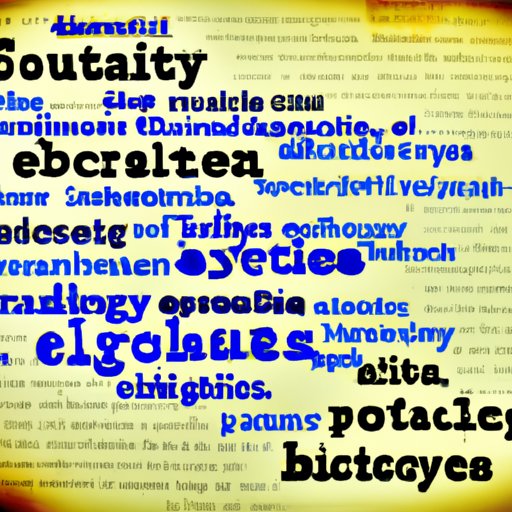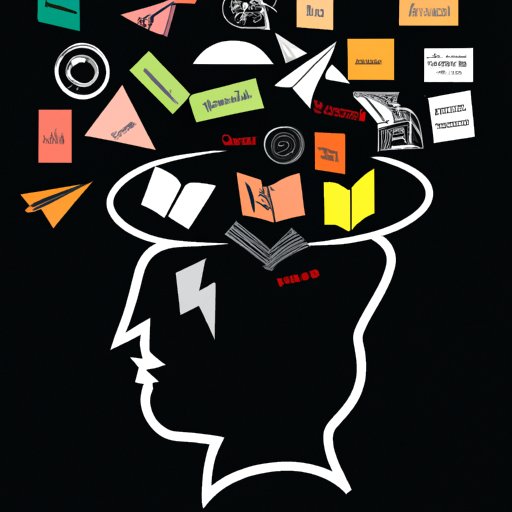Introduction
Literature is a form of art that has been around for centuries. It encompasses a range of genres, from fiction to non-fiction, poetry to plays, and short stories to novels. Literature can be used to explore a variety of topics, from history to science, philosophy to politics, and religion to romance. It is a powerful medium that has the potential to influence and shape societies, cultures, and individuals.
This article will explore why we read literature, looking at the impact it has on society, education and mental wellbeing. It will examine the benefits of reading literature and discuss the connection between literature and emotional intelligence.

Exploring the Impact of Literature on Society
Literature can have a profound effect on society, as it can provide insight into different perspectives and help to foster understanding between different groups of people. It can also help to challenge existing cultural values and beliefs, as well as promote social change.
Examining Cultural Values
Literature can help us to gain a better understanding of different cultures, as it can provide us with an insight into the values, beliefs and norms of a particular culture or society. As the writer Chinua Achebe once said, “Until the lions have their own historians, tales of the hunt shall always glorify the hunter”. By reading literature, we can gain a greater appreciation for the experiences and perspectives of different cultures, allowing us to gain a more rounded view of the world.
Understanding Social Connections
Reading literature can also help us to understand the complexities of human relationships and the various ways in which people interact. It can provide us with an insight into the motivations and feelings of others, helping us to build meaningful connections with those around us. According to a study by the University of Liverpool, reading literature can help us to “develop empathy, increase understanding of other people’s emotions and experiences, and allow us to see things from another’s perspective”.
Exploring the Role of Literature in Social Change
In addition to providing insight into different cultures and helping to foster understanding between people, literature can also be used to promote social change. By exploring controversial topics and challenging existing beliefs, literature can be used to encourage people to think differently and question the status quo. As the poet Maya Angelou once said, “The function of literature is to turn blood into ink”.
Examining the Benefits of Reading Literature
Reading literature can have a number of positive effects, from developing critical thinking skills to enhancing imagination and creativity. Let’s take a look at some of the benefits of reading literature.
Developing Critical Thinking Skills
Reading literature can help us to develop our critical thinking skills, as it encourages us to think deeply about the characters, themes and plot of a story. This can help us to make informed decisions and judgements in our lives, as well as helping us to become better problem solvers. According to a study by the University of Toronto, reading literature can help us to “analyse complex issues, draw conclusions based on evidence, and consider multiple points of view”.
Enhancing Imagination and Creativity
Reading literature can also help to enhance our imagination and creativity, as it allows us to explore different worlds and experience different perspectives. This can help us to come up with new ideas and solutions to problems, as well as encouraging us to think outside of the box. As the author J.K. Rowling once said, “Imagination is not only the uniquely human capacity to envision that which is not, and therefore the fount of all invention and innovation”.
Expanding Knowledge
Finally, reading literature can help us to expand our knowledge and understanding of the world. By reading books, we can learn about different cultures, histories and philosophies, allowing us to gain a better understanding of the world around us. As the author and poet Mary Oliver once said, “Tell me, what is it you plan to do with your one wild and precious life?”.

Investigating the Role of Literature in Education
Literature can also play an important role in education, as it can introduce students to different perspectives and help them to explore new ideas. Let’s take a look at some of the ways in which literature can benefit students.
Introducing Different Perspectives
Reading literature can help students to gain a better understanding of different perspectives, as it can provide an insight into the lives, experiences and beliefs of people from different backgrounds. This can help students to broaden their horizons and gain a greater appreciation for different cultures and societies. According to a study by the University of California, Berkeley, reading literature can help students to “understand the world outside of their own experience, and to appreciate the differences that exist between people”.
Allowing Students to Explore New Ideas
Reading literature can also help students to explore new ideas, as it encourages them to think critically about the characters, themes and plot of a story. This can help students to develop their problem-solving skills and come up with creative solutions to challenges. As the author Ursula K. Le Guin once said, “The creative adult is the child who survived”.
Providing a Foundation for Further Study
Finally, reading literature can provide students with a foundation for further study, as it can help them to develop their research skills and identify areas of interest. This can help students to decide on a course of study and pursue their passions. As the author Stephen King once said, “If you don’t have time to read, you don’t have the time (or the tools) to write”.
Understanding the Connection between Literature and Emotional Intelligence
Reading literature can also help to improve our emotional intelligence, as it can help us to understand and empathise with others. Let’s take a look at some of the ways in which literature can help to foster emotional intelligence.
Examining the Effects of Reading Fiction
Reading fiction can help us to gain a better understanding of the emotions and experiences of others, as it allows us to put ourselves in someone else’s shoes. This can help us to relate to people better and develop our emotional intelligence. According to a study by the University of Sussex, reading fiction can help us to “recognise and respond appropriately to the emotions of others”.
Understanding the Power of Storytelling
Storytelling can also be a powerful tool for improving emotional intelligence, as it can help us to understand the motivations and feelings of others. By listening to stories, we can gain a better understanding of the human condition and the struggles that people face. As the author Chimamanda Ngozi Adichie once said, “Stories can break the dignity of a people, but stories can also repair that broken dignity”.
Learning Empathy through Literature
Finally, literature can help us to learn empathy, as it can provide us with an insight into the thoughts, feelings and motivations of others. This can help us to develop our emotional intelligence and foster understanding between people. As the author Jodi Picoult once said, “Empathy is really the opposite of spiritual meanness. It’s the capacity to understand that every war is both won and lost. And that someone else’s pain is as meaningful as your own”.

Analyzing the Psychological Effects of Literature
Reading literature can also have a number of psychological benefits, from understanding the effects of reading poetry to exploring the role of characters in psychology. Let’s take a look at some of the ways in which literature can affect our mental wellbeing.
Understanding the Effects of Reading Poetry
Reading poetry can help to improve our mental wellbeing, as it can provide us with a sense of comfort and security. According to a study by the University of Oxford, poetry can help to reduce stress and anxiety, as it can “provide a sense of solace, comfort and even pleasure”. In addition, poetry can also help us to express our emotions, allowing us to gain a better understanding of our feelings and experiences.
Examining the Effects of Reading Non-Fiction
Reading non-fiction can also have a positive effect on our mental wellbeing, as it can help us to gain a better understanding of the world around us. According to a study by the University of Cambridge, reading non-fiction can help to reduce stress and anxiety, as it can “provide a sense of control and mastery over our environment”. In addition, non-fiction can also help us to develop our problem-solving skills and come up with creative solutions to challenges.
Exploring the Role of Characters in Psychology
Finally, understanding the motivations and feelings of characters in literature can also help to improve our mental wellbeing, as it can provide us with an insight into our own emotions and experiences. According to a study by the University of Leeds, understanding the characters in literature can help us to “gain a better understanding of our own emotions and the emotions of others”. This can help us to develop our emotional intelligence and foster understanding between people.
Conclusion
In conclusion, this article has explored why we read literature, looking at the impact it has on society, education and mental wellbeing. It has examined the benefits of reading literature, such as developing critical thinking skills, enhancing imagination and creativity, and expanding knowledge. It has also discussed the connection between literature and emotional intelligence, examining the effects of reading fiction, understanding the power of storytelling, and learning empathy through literature. Finally, it has analyzed the psychological effects of literature, exploring the effects of reading poetry and non-fiction, and examining the role of characters in psychology.
Overall, reading literature can have a number of positive effects, from developing critical thinking skills to fostering empathy and promoting mental wellbeing. Therefore, it is important to encourage further exploration of literature and to continue to reap the many benefits it has to offer.
(Note: Is this article not meeting your expectations? Do you have knowledge or insights to share? Unlock new opportunities and expand your reach by joining our authors team. Click Registration to join us and share your expertise with our readers.)
